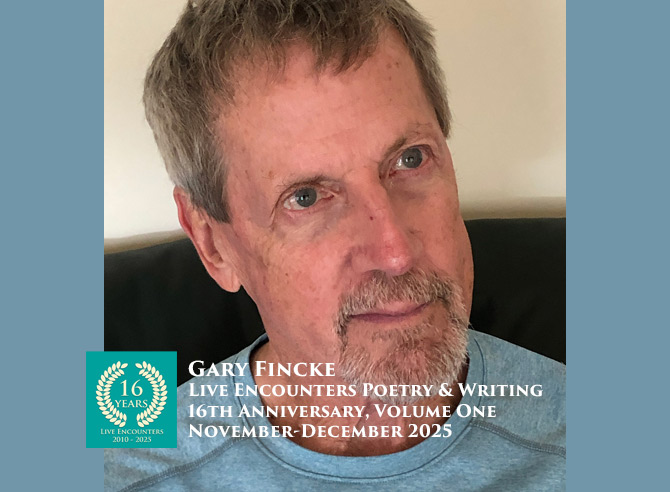
Live Encounters Poetry & Writing 16th Anniversary Volume One
November- December 2025
While our Newspapers Starved, poems by Gary Fincke.
While our Newspapers Starved
During the endless war, the civil one
when we raised hate like hybrid tomatoes
our children could swallow like caplets,
our devices hummed like lovers’ demands.
They glowed with memes. Their slogans walked
with us while our newspapers starved until
they became a few paragraphs, then less,
then merely a provocative headline with photos.
We open-carried at the grocery store.
We flew flags and sanctimony, trained
our dogs to be fences along the borders
of our small, carefully surveyed lots.
News kept breaking while we posted
the recipes of neighbors. Each update
sentence about the war drew thousands
of comments, punditry spreading
like highly contagious airborne flu.
Subtlety was shed like unwanted fat.
The world we knew was thinner now,
relying upon the app for true or false.
Each night arrived despite the debate
on darkness, whether or not it was
deepening, threatening to become
perpetual, expanding like a universe
that will never cease to widen, or,
according to others, collapsing back
into the tiny, pulsing, dot that contains
everything all of us supposed was true.
Drought-struck Plants
Squeal in Distress
The afternoons are worst, even
the succulents in the shade
beginning to whine like our dog
during its throes of dreams.
Those in full sun—the hardy,
decorative grasses, the iris,
and the prolific yucca–
drive us indoors with their
wailed cantatas of sorrow.
Months now, since anxiety
swelled to anger, how tired
they were of us explaining
that our surreptitious
dawn and dusk sprinklings
were the best we could do.
Look, we say, somebody
has cut our garden hoses.
Green is taboo, your leaves
a loud, public confession.
A short walk from here, fields
of corn cry in unison,
inconsolable as infants
in the expanding famine zone,
the ones whose mouths we used
to cover with monthly checks.
The house plants, though locked
inside their gated community,
are frightened by conservation.
For weeks, they have asked
for increased security.
Among themselves, they discuss
who would be easiest for us
to sacrifice, their squeals,
like yours, no longer coded.
Despite our care, even the cacti
loathe us enough to wish us
dead. Suicidal, they agree,
but the world, in time,
would flourish without us,
that assurance no more flimsy
than your cautious talk of souls.
A Homily
Just now, I’ve learned the vocabulary
for grapefruit, how it is the endocarp
that is savored and swallowed while
the albedo is the bitter mistake
caused by careless sectioning, what,
each morning, in the kitchen before
breakfast, my mother never made with
her curved, pliable, serrated knife,
already dressed as if she needed
to be prepared for emergencies
that drew assistance into the house–
police, EMTs, the doctor who lived
in a house walking distance from us.
Always, I ate those sections before
cereal, even the somber bran flakes
that end-stopped her morning routine,
a synonym, then, for comforting. But
not necessarily, not, this week, when
my urologist announced, “This routine
procedure is performed without sedation,”
reaffirming that standard for stent
removal a week after my surgery,
extracting it through the one and
only orifice option in what he called
“a bit of tidy-up.” Not something that
felt like the soul leaving my body
before my brain’s run was canceled,
how I described the sensation to him,
not receiving as much as a wry smile,
nothing, as well from his beautiful nurse,
her expression fixed somewhere
between bemused and indifference.
All week, I’ve told this post-surgery story
as if it needed an afterword, ending with
“It was really something,” so ecstatic in
conclusion that I’ve relied upon my mother’s
expression for unaccountable sensation
as a synonym for inevitable instead
of including the details of exposure—
the soft penis on display, the nerves
broadcasting an exclamatory sentence
of helplessness–satisfied to be survivor
of nothing more than surgical routine,
my body’s flaw repaired like a slow,
persistent drip from a seldom-used
downstairs bathroom. Not shouldering
the silence my mother carried with her
when her dread of the procedures
that might, for years, have prolonged
her life as someone other than herself,
counseled her to dress as carefully
as a bride, closed her bedroom door,
laid her down, and extinguished her.
© Gary Fincke
Gary Fincke’s latest poetry collection is The Necessary Going On: Selected Poems (Press 53, May, 2025). His most recent book is After Arson: New and Selected Essays (Madville Press, Oct. 25).

